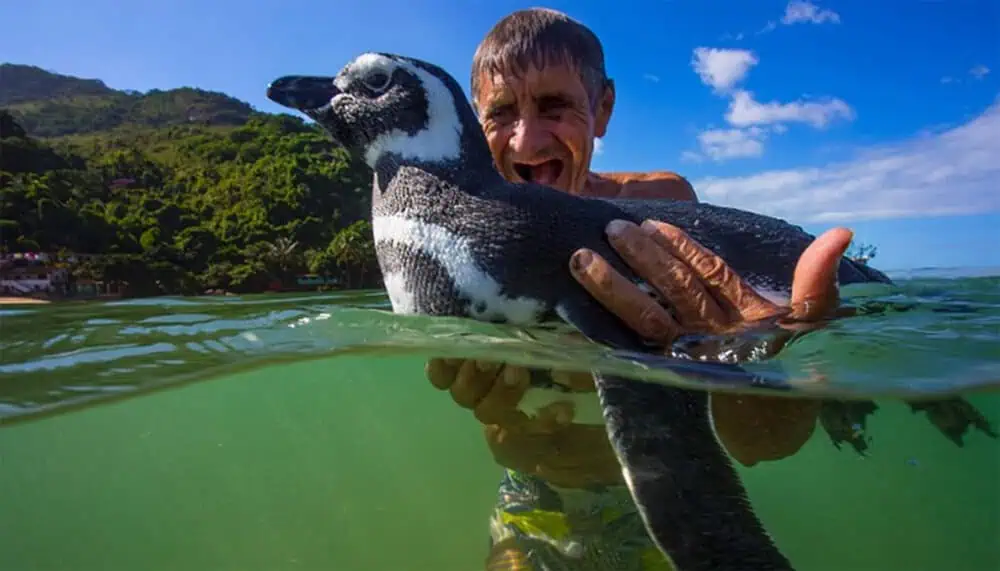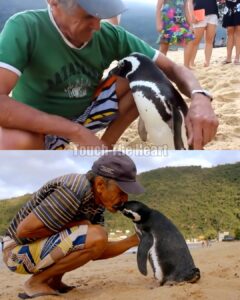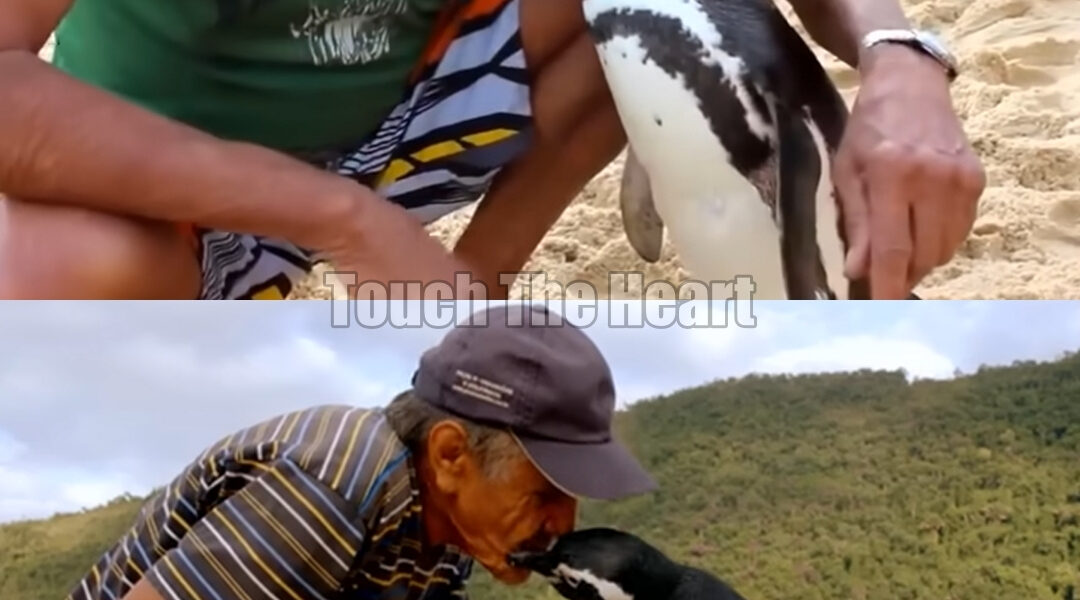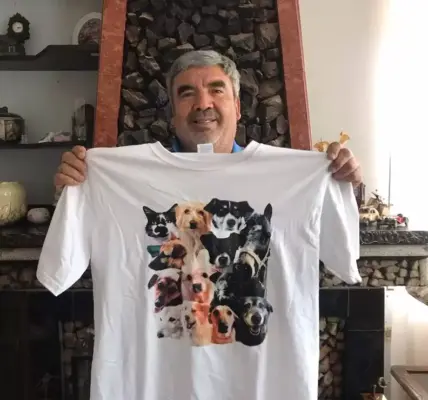Under the heat of the Brazilian sun, long before the world ever heard his name, a small penguin lay dying on the shore — feathers slicked in black oil, wings too heavy to lift, breath shallow and fading. He was not supposed to be there. Magellanic penguins live thousands of miles away, in the cold currents of Argentina and Chile. But the ocean had carried him here, wounded and alone, onto a beach he was never meant to reach.
And that was where a retired bricklayer named João Pereira de Souza first saw him.
João was not a scientist. Not a rescuer. Not a man with a degree in marine life. He was simply a fisherman who had spent his whole life by the sea — a man who knew the ocean’s moods, its gifts, and its cruelties. But that day, when he saw the tiny creature trembling on the rocks, something inside him refused to walk past.
He bent down, touched the sticky black feathers, and understood: if he left the penguin there, it would die.
So he picked him up — gently, like something fragile — and carried him home.

The penguin was barely alive. João spent hours cleaning the oil from his feathers, warming him, feeding him pieces of fish by hand. He gave the little bird a name: Dindim. He did not expect him to survive the night.
But Dindim did.
And then he survived the next night.
And then the next.
Day after day, João washed him, fed him, watched him regain strength. The penguin — once terrified and weak — began to follow him around the yard, flapping his wings, calling out whenever João disappeared from sight. Soon, he was more than just a rescued animal.
He was family.
The villagers laughed at the sight: a 71-year-old man walking around with a penguin waddling behind him like a loyal dog. But João didn’t care. He felt something deeply simple and deeply true — that life had given him a companion he never asked for, but somehow needed.

When Dindim was strong enough, João knew he had to set him free. The law was clear: wild animals belong to the wild. So one morning, he placed Dindim into a small boat and took him out to sea.
“Go,” he said softly. “Your home is out there.”
But Dindim didn’t move.
He just looked at João, head tilted, as if the ocean meant nothing without the man who saved him.
When João pushed him gently into the water, the penguin swam — just far enough to float beside the boat… and then climbed right back in.
The people said, “He’ll leave eventually. He’ll forget you.”
João nodded. He knew that was how nature worked.
Except — Dindim didn’t leave.
He stayed with João for almost a full year, living like a member of the family, letting only one person touch him, groom him, feed him.
“He loves sardines,” João laughed once. “And showers. He won’t let anyone else wash him. Only me.”
When the penguin finally did leave — when instinct pulled him back to sea — João stood on the shore and waved goodbye, believing he had given all he could.
He thought that was the end of the story.
But it wasn’t.

Months passed. Then seasons. Then almost a year.
And then one afternoon, a familiar shape appeared in the water — flapping, calling, swimming toward the shore with the determination of something that knew exactly where it was going.
Dindim had come back.
He didn’t hesitate. He waddled straight to João, brayed like a greeting, and pressed his head into the old man’s leg.
Four thousand miles of ocean.
Hundreds of dangers.
Every instinct saying: stay with your own kind.
And still — he came back.
The neighbors couldn’t believe it. Scientists said it was impossible. Reporters called it a misunderstanding. But Dindim returned again the next year.
And the next.
And the next.
Every June, the same miracle: a penguin swimming from the southern edge of the continent to a single house on a single beach, to see one man, and only him.
João stroked his feathers, kissed his head, talked to him like a son.
“I love the penguin like it is my own child,” he told Globo TV. “And I believe… the penguin loves me.”
When others tried to touch Dindim, he snapped at them.
But when João held him? The penguin melted — relaxed, trusting, gentle as a pet who knew exactly whose hands had saved his life.
Scientists later confirmed what made the story even stranger:
Magellanic penguins are not known to form lasting bonds with humans.
They do not migrate to the same place every year.
They do not swim to foreign beaches to visit a person.
Yet Dindim broke every rule.
Why?
No one can explain it.
Maybe love — real love — doesn’t care about rules.
Maybe gratitude carves a map deeper than instinct.
Maybe a creature who nearly died remembers the one who chose to save him.
All anyone knows is this:
Every year, Dindim makes the 8-month round trip across the ocean, only to stay with João for 4–5 months — following him, sleeping beside him, letting him hold him like a baby.
João is old now. He sometimes wonders who will go first — the penguin or the man.
But when they are together, there is no sadness in him. Only joy. Only wonder.
“People say animals don’t feel,” he once said, smiling as Dindim rested in his lap. “But he knows. He knows I saved him. And he comes back to thank me.”
There are stories the world writes into books — heroic, dramatic, unbelievable.
And then there are stories life writes quietly — one man, one penguin, one impossible bond that asks for nothing except to continue.
On a lonely beach in Brazil, a bird who should have forgotten…
remembers.
And a man who thought his life had already lived all its chapters…
gets a new one every year, carried to him on a wave of saltwater and devotion.
No language shared.
No promises made.
Just love.
Pure, untrained, unexplainable love.
And maybe that is the greatest miracle in the whole story:
Not that a penguin swims back to a man…
but that the world still holds places where kindness comes back — even across an ocean.




